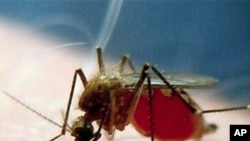U.S. medical researchers report a possible breakthrough that might prevent infection by one of the two most widespread varieties of malaria.
A new class of anti-malaria compounds kills the parasites in the developmental stages in the liver, before they get into the bloodstream.
The compounds proved highly successful in animal tests, according to a study published in Science, but their effectiveness in humans is still unproven.
Plasmodium vivax is the dominant strain of the malaria parasite outside Africa. Unlike the more deadly Plasmodium falciparum, vivax can infect a person but stay dormant in the liver for months or even years, before emerging to cause disease.
Scientists at the Scripps Research Institute in California and other institutions evaluated chemical compounds that were known to kill the malaria parasite in the blood. They were looking for ones that also might kill the parasite in its dormant liver stage.
In this study, the researchers mixed each one of the compounds with malaria parasites taken from live mosquitoes. Each combination was put with liver cells into individual compartments, called wells, on a microscope slide. Author Elizabeth Winzeler explains that to screen thousands of chemicals as potential malaria drugs required some sophisticated technology.
"We used an automated microscope to go and take about 100 images of each of the wells, and then we used computer scripts to analyze the images and identify those wells that had compounds that appeared to affect the development of the parasites."
To test potential drugs developed from the chemicals that looked promising, Winzeler and her colleagues infected laboratory mice with the malaria parasite. Left alone, the mice died within 10 days. But "if you give the mice the same treatment, and you give them a small oral dose of the compounds that we made, the mice are cured or they never develop malaria in the first place."
These new substances, called IZPs, are effective in mice, Winzeler says, "but there's always a big step between going from something that works in a mouse model and actually going into something that's safe and efficacious in humans."
Researchers at Scripps, backed by the pharmaceutical company Novartis, are now considering that next step, safety testing in humans.
If successful, this work could lead to a malaria drug that attacks the dormant stage of the parasite, which occurs only in the Plasmodium vivax form of the disease. Scientists theorize that this period of dormancy was an evolutionary strategy to keep infection active through the cold winter months.
"For example, vivax malaria was found in places like Finland and England, up until about 100 years ago. And clearly, there weren't mosquitoes out biting people in December."
Vivax now occurs mainly in Asia and Latin America.




